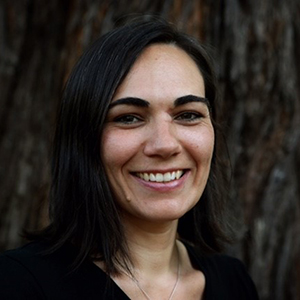Denika Thomas
 Denika Thomas
Denika Thomas
Breaking cycles in the here and now
Social worker Denika Thomas is a great believer in the theory that the past and present are prologues; that our history morphs into the now, and can shape our future.
“It’s all connected, so we need to address it simultaneously,” says the senior mental health manager with the Illawarra Women’s Health Centre. “Children who have been exposed to trauma have a high likelihood of being exposed again and again throughout their lifetime unless you break the cycle. A lot of my work involves sitting with the uncomfortable.”
Denika specialises in trauma therapy, in a region where women are subjected to high levels of domestic violence and rape, exposure to sexual and reproductive health risks, and soaring rates of anxiety and depression. Established 30 years ago, the health centre prides itself on its team of health professionals, who provide safe, accessible and affordable health care, especially for vulnerable and marginalised women.
“I was always interested in the women and injustice space, and while completing my Social Work degree at UNE I worked with women in out-of-home care,” Denika says. “It has since become a passion; to develop programs that empower women to protect themselves, to be mentally and physically healthy and resilient.”
This professional development has mirrored personal growth, too.
“I am always engaging with the uncomfortable, so that requires constant critical reflection on how I am feeling and why,” Denika says. “It involves putting my own feelings in context; considering that if the story or experience made me uncomfortable, what was it like for the client who went through it? All of us who walk alongside vulnerable people need to work on ourselves as well. Only then can we give them the best support possible.”
Since joining the centre and rising up through its ranks, that has required Denika to confront a number of home truths –notably the grief, loss and trauma of her own family history and the broader communities she has lived in.
“I am an Aboriginal woman and growing up I was exposed to the injustices, the unconscious and institutionalised racism,” she says. “I was a child in care as well. But there were people who made a huge difference to the way I navigated my life, and that’s why I now want to give back to the community.”
Practising as a social worker within Aboriginal communities does, however, present unique challenges. “It’s a very complicated space,” Denika says. “When I became qualified, I went back to the aunties who had supported me and asked them what they wanted me to do. I got this degree not just for myself, but also to be directed by my community as to where the need is. At the time it was with young women.”
The program that Denika developed for at-risk young women in the Illawarra used Aboriginal teachings and a range of evidence-based strategies to give them access to health information and services like one-on-one counselling. Embedding social workers in schools and the community, she pioneered programs designed to foster self-confidence, leadership, connections and health awareness that are still being offered a decade later.
“The young women were hungry for knowledge around sexual health, but accessing this information was really shameful for them, so it needed to be based on trusted relationships,” Denika says. “I was dedicated to creating safe spaces for women to talk about whatever their needs were, to support them to make positive changes in their lives.”
Growing up, Denika engaged with case managers who respected her culture and understood the importance of building such connections. “Many were also Aboriginal and I remember being introduced to their families, being taken to their homes for family barbecues and playing with their kids,” she says. “They are some of my fondest memories.
“Working in community as an Aboriginal person within a social work position is possibly a little tougher today because of the history of the stolen generations and welfare. You have to prove that you are not there to just place a mandatory report in, but there to support the client in what is best for them. That’s why relationships and participating in community gatherings with my own family are key. It helps remove some of the barriers. Sometimes you have to undo how you have been taught to be a social worker.”
Such life lessons now form part of Denika’s teaching of social work at the University of Wollongong and guide her mentoring of Aboriginal and Torres Strait Islander students. Her professional experiences also inform policy work with the NSW Ministry of Health, where Denika has been part of a committee advising on Aboriginal Action Plans relating to sexual assault.
Her final admission, then, is telling. “At UNE I didn’t tick the box that I was an Aboriginal student,” Denika says. “At the time there was a lot of fear around positions of power in the education system and my aunties advised me not to make myself stand out as an Aboriginal woman. But now I wish I had of.”
Denika says she is much more comfortable with her past and the possibilities of the future. “I’m really grateful that I was able to get my degree,” she says. “I was the first one in my family to finish high school let alone go to university. I have been able to break some cycles that I sought to break.
“And I now feel like I have a voice that can help create change. I always thought that’s what social work was about – being a change maker. I am doing that now, in the little changes I help individual clients to make and the much larger societal change that’s capable through the Ministry of Health initiatives.”

